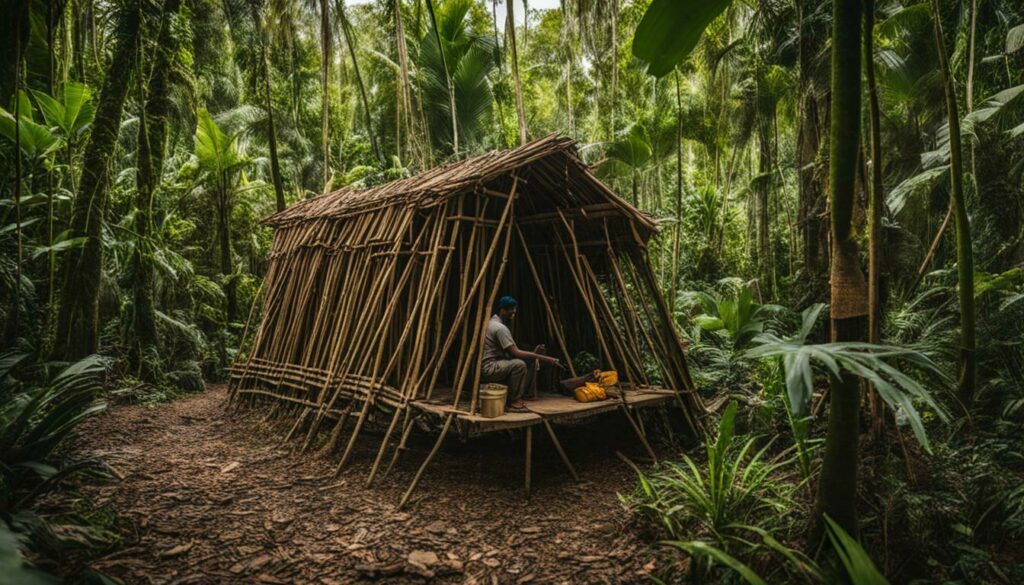Discover how to master survival skills in tropical areas with our comprehensive guide. Whether you find yourself stranded on a tropical island or venturing into the dense jungles, being equipped with essential survival skills is crucial. Our guide will provide you with the knowledge and techniques needed to navigate and thrive in tropical environments.
- Survival training courses are available for individuals, couples, and groups.
- These courses teach participants how to find food, water, and shelter in the wilderness.
- Locations for survival training courses include Ulaanbaatar, Mongolia, Femundsmarka National Park in Norway, and Mount Kilimanjaro in Tanzania.
- Participants learn specific techniques for each location, such as collecting edible plants and building natural shelters.
- Survival training builds confidence and equips individuals with the skills to handle any situation.
Are you ready to embark on a journey of tropical survival preparedness? Our guide will provide you with the necessary knowledge and skills to navigate the challenges of tropical environments. Stay tuned for the upcoming sections where we delve deeper into the importance of survival skills, understanding tropical environments, navigation techniques, and finding food in tropical areas. Let’s equip ourselves with the tropical survival knowledge needed to thrive in any situation.
Why Are Survival Skills Important in Tropical Areas?

Surviving in tropical climates requires specialized skills and knowledge due to the unique challenges these environments present. From dense jungles teeming with dangerous wildlife to extreme heat and humidity, being prepared is essential for anyone venturing into tropical areas. Understanding the importance of survival skills can mean the difference between life and death in these unforgiving landscapes.
One of the main reasons why survival skills are crucial in tropical areas is the abundance of potential dangers. The dense vegetation of jungles can make navigation difficult, and without proper orientation skills, getting lost is a real possibility. Additionally, tropical climates can also bring about exposure to extreme weather conditions, such as hurricanes or torrential rainfall, which can quickly turn a situation from challenging to life-threatening.
Another key factor is the scarcity of resources in tropical environments. While the lush vegetation and diverse wildlife may seem abundant, knowing how to identify edible plants and safely catch food is essential for survival. Without this knowledge, one could easily fall victim to dehydration, malnutrition, or consuming toxic plants.
Survival Courses in Tropical Areas
If you’re planning to explore tropical areas or simply want to equip yourself with valuable survival skills, enrolling in a survival training course can be an excellent option. These courses provide hands-on experience and expert guidance in navigating and surviving in various tropical environments. From learning to build natural shelters to mastering navigation techniques, these courses ensure that you are prepared for any situation.
Survival training courses are available for individuals, couples, groups, and even for team-building purposes. These courses provide participants with the knowledge and skills to survive in the wilderness by learning how to find food, water, and shelter. The courses vary in duration and take place in various locations, such as Ulaanbaatar, Mongolia, Femundsmarka National Park in Norway, and Mount Kilimanjaro in Tanzania. Participants learn techniques specific to the location, such as collecting edible plants, building natural shelters, and navigating the terrain. Whether you are stranded on a tropical island or in snowy climates, survival training will help you build the confidence and skills needed to handle any situation.

Equipping yourself with the necessary survival skills for tropical areas is not only crucial for adventurers, but it is also valuable knowledge for anyone living or traveling in these regions. From understanding the environment to navigating with confidence and finding food sources, these skills empower you to face the challenges head-on.
By investing time and effort into learning these essential skills, you are taking a proactive step towards ensuring your safety and well-being in tropical areas. So, whether you’re planning a thrilling jungle expedition or simply want to be prepared for any situation, consider mastering the art of survival in tropical environments.
Understanding Tropical Environments
To survive in the tropics, it is essential to have a comprehensive understanding of the unique characteristics of tropical environments, such as the dense jungles and diverse wildlife. These environments can be both beautiful and challenging, and being properly prepared is key to ensuring your safety and survival. Let’s take a closer look at some of the key aspects of tropical wilderness survival.
The Jungle: Tropical jungles are known for their dense vegetation and abundant wildlife. They are teeming with life, including various species of plants, animals, and insects. Navigating through the jungle requires skill and knowledge. One must be able to identify edible plants, understand animal behavior, and be cautious of potential hazards like poisonous snakes or deadly spiders. Being aware of your surroundings and having the ability to read signs and tracks can greatly increase your chances of survival.
Flora and Fauna: The flora and fauna found in tropical environments are incredibly diverse. From towering trees to vibrant flowers and unique plant species, the plant life is rich and abundant. It is important to learn to identify edible plants and understand their nutritional value. Additionally, being aware of the animal life is crucial for both safety and sustenance. Knowing which animals are dangerous and how to avoid them, as well as which animals can be hunted for food, can mean the difference between survival and disaster.

Terrain: Tropical environments can offer a wide range of terrains, from dense forests to rugged mountains and swampy marshes. Understanding how to navigate these terrains is crucial for survival. Knowing how to read maps, use a compass, and identify natural landmarks can help you stay on course and avoid getting lost. It is also important to be prepared for sudden changes in weather and terrain, such as heavy rains or flash floods, which can pose additional challenges.
- Understanding the unique characteristics of tropical environments is essential for survival.
- Tropical jungles are dense and teeming with diverse flora and fauna.
- Identifying edible plants and knowing animal behavior are crucial skills.
- Navigating through various terrains requires knowledge of maps, compasses, and natural landmarks.
| Flora | Fauna | Terrain |
|---|---|---|
| Towering trees | Diverse animal species | Dense forests |
| Vibrant flowers | Opportunity for hunting | Rugged mountains |
| Unique plant species | Potential dangers | Swampy marshes |
Navigating in Tropical Areas
Having effective navigation skills is crucial when navigating through the dense and unfamiliar terrain of tropical areas. Whether you find yourself in a thick jungle or a remote island, knowing how to orient yourself and find your way is essential for your survival. In this section, we will explore some valuable tropical survival tips and techniques that will help you navigate with confidence.
One of the first things to consider when navigating in tropical areas is using natural landmarks and the position of the sun and stars to determine your direction. By observing your surroundings and understanding how the natural elements can be used as navigational aids, you can increase your chances of finding your way back to safety. Additionally, it is important to have a basic understanding of using a compass and reading maps, as these tools can provide valuable guidance in challenging environments.
Equipping yourself with the right tools is also essential for successful navigation in tropical areas. Items such as a reliable GPS device, a sturdy compass, and a topographic map of the region can significantly improve your navigation capabilities. It is equally important to have a good understanding of the terrain you will be navigating, as this will help you anticipate challenges and plan your route accordingly.
| Tropical Survival Tips: |
|---|
| 1. Study the local terrain and familiarize yourself with the natural landmarks and features. |
| 2. Learn to use the position of the sun and stars for navigation during daylight and nighttime. |
| 3. Invest in a quality compass and learn how to read maps. |
| 4. Carry a GPS device and a topographic map of the area for added navigation support. |
| 5. Practice navigation skills in various environments to build confidence and proficiency. |
By honing your navigation skills and being prepared with the right tools and knowledge, you can navigate through tropical areas with confidence and increase your chances of survival. Remember, practice makes perfect, so take the time to practice your skills in different environments to ensure you are well-prepared for any situation.
Finding Food in Tropical Environments
Knowing how to find food sources in tropical environments is vital for your survival. In these lush and diverse ecosystems, there are numerous edible plants, fruits, and insects that can sustain you. However, it is essential to have the knowledge and skills to identify safe and nutritious food sources.
One of the most important tropical survival techniques is learning how to identify edible plants. Familiarize yourself with the local flora and learn which plants are safe to eat. Look for plants with familiar characteristics, such as berries, nuts, or leaves that resemble those of common edible plants.
In addition to plants, tropical environments offer various opportunities for catching fish. Rivers, streams, and coastal areas often teem with fish, providing a reliable source of protein. Learn different fishing techniques, such as using nets, traps, or making improvised fishing lines and hooks.
Foraging is another valuable skill to master in tropical environments. Take the time to learn about the edible insects and other small wildlife that inhabit these areas. Insects such as ants, termites, and grubs can provide a significant source of protein. However, ensure that you have the necessary knowledge to distinguish between safe and toxic species.
By acquiring these essential survival skills for tropical environments, you can increase your chances of finding food and sustaining yourself in challenging situations. Remember to always prioritize safety, learn from experienced guides, and respect the environment you are in. With the right knowledge and preparation, you can navigate tropical environments with confidence and ensure your survival.
FAQ
Q: Who can participate in the survival training courses?
A: The survival training courses are available for individuals, couples, groups, and even for team-building purposes.
Q: Where do the survival training courses take place?
A: The survival training courses take place in various locations, such as Ulaanbaatar, Mongolia, Femundsmarka National Park in Norway, and Mount Kilimanjaro in Tanzania.
Q: What will participants learn in the survival training courses?
A: Participants will learn techniques specific to the location, such as collecting edible plants, building natural shelters, and navigating the terrain.
Q: Will the survival training courses prepare participants for different climates?
A: Yes, the survival training courses are designed to prepare participants for various climates, including tropical areas and snowy climates.
Q: How will survival training help in handling different situations?
A: Survival training will help build the confidence and skills needed to handle any situation, whether you are stranded on a tropical island or in snowy climates.






